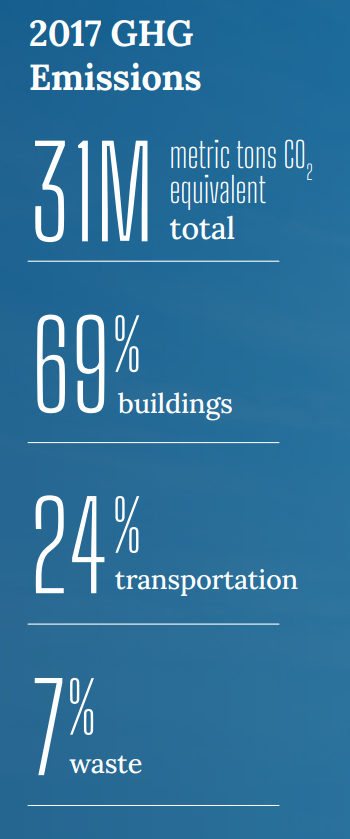Electrify Chicago
An independent tool for viewing City of Chicago building data
According to the
2022 Chicago Climate Action Plan,
69% of Chicago's emissions come from buildings, making
building emissions our biggest challenge and our biggest opportunity as a city
to tackle climate change. At Electrify Chicago, we showcase building performance using
publicly available data supplemented by community-submitted photographs and building
owners.
Start by looking at Chicago's buildings with the highest greenhouse gas intensity i.e. emissions per square foot. Large, efficient, buildings can perform much better than very inefficient small buildings on this metric.
New Article
📰 $30 Million In Missed Fines
The City Of Chicago failed to collect $30 million in potential fines from the building benchmarking ordinance, reducing transparency and accountability.
Legislative update! 🎉
As of late January 2024, legislation is being introduced to require new use more efficient forms of water and space heating, via the Clean And Affordable Buildings Ordinance (CABO), which will reduce the number of highly polluting and inefficient buildings that end up on this site.
If you're in Chicago,
write to your alderman to support the CABO!
Chicago Buildings by Greenhouse Gas Intensity
Note: Data includes large Chicago buildings with data from 2022, unless explicitly stated otherwise.
Note: This data only includes buildings whose emissions are reported
under the
Chicago Energy Benchmarking Ordinance. According to the City “As of 2016,
this list includes all commercial, institutional, and residential buildings larger than
50,000 square feet.” This dataset is also then filtered to only buildings with
reported emissions > 1,000 metric tons CO2 equivalent.
The latest year of data is from 2022, but we update the site regularly when new data is available, and some buildings may have failed to report that year, and only have older data available.
| Property Name / address | Primary Property Type |
Greenhouse Gas Intensity (kg CO2 eq./sqft) |
Total Greenhouse Emissions (metric tons CO2 eq.) |
|---|---|---|---|
|
9 W Walton St
9 W Walton St
| Multifamily Housing | 7.4 kg/sqft
Highest 33%
| 2,794 tons
Highest 15%
|
|
Catalyst
123 N Desplaines St
| Multifamily Housing | 7.4 kg/sqft
Highest 33%
| 1,876 tons
Highest 25%
|
|
CICS Ralph Ellison (St Thomas Moore)
1817 W 80th St
| K-12 School | 7.4 kg/sqft
Highest 33%
| 510 tons
Lowest 27%
|
|
Prairie Point Condominium
1600 S Prairie Ave
| Multifamily Housing | 7.4 kg/sqft
Highest 33%
| 1,992 tons
Highest 23%
|
|
Juarez Com Academy HS -CPS
(CPS)
2150 S Laflin St
| K-12 School | 7.4 kg/sqft
Highest 33%
| 1,889 tons
Highest 24%
|
|
George M Pullman Elementary School
🕰️
(CPS)
11311 S Forrestville Ave
| K-12 School | 7.4 kg/sqft | 593 tons |
|
Lyon Elementary -CPS
(CPS)
2941 N Mcvicker Ave
| K-12 School | 7.4 kg/sqft
Highest 33%
| 875 tons
Lowest 49%
|
|
Hayt Elementary, Stephen K -CPS
(CPS)
1518 W Granville Ave
| K-12 School | 7.4 kg/sqft
Highest 33%
| 875 tons
Lowest 49%
|
|
Bell Elementary -CPS
(CPS)
3730 N Oakley Ave
| K-12 School | 7.4 kg/sqft
Highest 33%
| 829 tons
Lowest 48%
|
|
Ariel Elemenentary-CPS
(CPS)
1119 E 46th St
| K-12 School | 7.4 kg/sqft
Highest 33%
| 1,093 tons
Highest 42%
|
|
Nathanael Green -CPS
🕰️
(CPS)
3525 S. Honroe
| K-12 School | 7.4 kg/sqft | 613 tons |
|
Nicholson Math And Science Elementary - CPS
(CPS)
6006 S Peoria St
| K-12 School | 7.4 kg/sqft
Highest 33%
| 527 tons
Lowest 29%
|
|
Norwood Park Elementary -CPS
(CPS)
5900 N Nina Ave
| K-12 School | 7.4 kg/sqft
Highest 33%
| 417 tons
Lowest 18%
|
|
Gold Coast Galleria
111 W Maple St
| Mixed Use Property | 7.4 kg/sqft
Highest 33%
| 3,401 tons
Highest 11%
|
|
Arturo Velasquez Institute
🕰️
(City Colleges)
2800 S Western Ave
| College/University | 7.4 kg/sqft | 1,300 tons |
Data Source:
Chicago Energy Benchmarking Data
